
The Libro de los Juegos, or Libro de axedrez, dados e tablas, was commissioned by Alfonso X of Castile, Galicia and León and completed in his scriptorium in Toledo in 1283, is an exemplary piece of Alfonso's medieval literary legacy.

Alfonso X was the king of Castile, León and Galicia from 30 May 1252 until his death in 1284. During the election of 1257, a dissident faction chose him to be king of Germany on 1 April. He renounced his claim to Germany in 1275, and in creating an alliance with the Kingdom of England in 1254, his claim on the Duchy of Gascony as well.
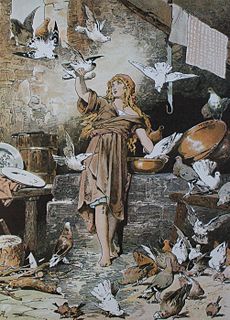
"Cinderella", or "The Little Glass Slipper", is a folk tale about oppression and triumphant reward. Thousands of variants are known throughout the world. The protagonist is a young woman living in forsaken circumstances that are suddenly changed to remarkable fortune, with her ascension to the throne via marriage. The story of Rhodopis, recounted by the Greek geographer Strabo sometime between around 7 BC and AD 23, about a Greek slave girl who marries the king of Egypt, is usually considered to be the earliest known variant of the Cinderella story.
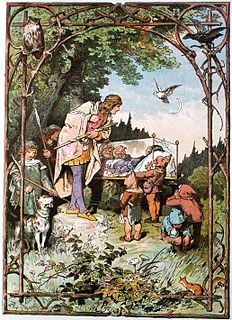
"Snow White" is a 19th-century German fairy tale that is today known widely across the Western world. The Brothers Grimm published it in 1812 in the first edition of their collection Grimms' Fairy Tales and numbered as Tale 53. The original German title was Sneewittchen, a Low German form, but the first version gave the High German translation Schneeweißchen, and the tale has become known in German by the mixed form Schneewittchen. The Grimms completed their final revision of the story in 1854.
A stepmother is a woman who enters one's family by marrying one's parent. Children from her spouse's previous unions are known as her step-children.
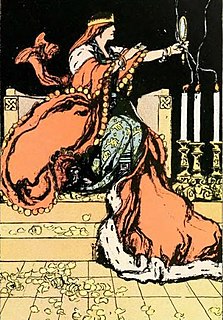
The Evil Queen, also called the Wicked Queen, is a fictional character and the main antagonist of "Snow White", a German fairy tale recorded by the Brothers Grimm; similar stories are also known to exist in other countries. Other versions of the Queen appear in "Snow White" derivative works, and the character has also become an archetype for unrelated works of fiction.
Guillaume de Palerme is a French romance poem, which has been translated into English. The French verse romance was composed c. 1200, commissioned by Countess Yolande. The prose version of the French romance, printed by N Bonfons, passed through several editions.
A stepfather or stepdad is a non-biological male parent married to one's preexisting parent.

Syntipas is the Greek form of a name also rendered Sindibad, Sendabar, Çendubete (Spanish) and Siddhapati in other versions of the popular Oriental romance in which he appears as a leading character. Because of its popularity, he was also credited with a collection of Greek-derived fables in mediaeval times.
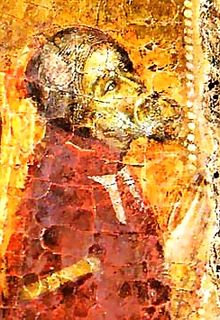
Don Juan Manuel was a Spanish medieval writer, nephew of Alfonso X of Castile, son of Manuel of Castile and Beatrice of Savoy. He inherited from his father the great Seigneury of Villena, receiving the titles of Lord, Duke and lastly Prince of Villena. He married three times, choosing his wives for political and economic convenience, and worked to match his children with partners associated with royalty. Juan Manuel became one of the richest and most powerful men of his time, coining his own currency as the kings did. During his life, he was criticised for choosing literature as his vocation, an activity thought inferior for a nobleman of such prestige.

The Seven Wise Masters is a cycle of stories of Sanskrit, Persian or Hebrew origins.
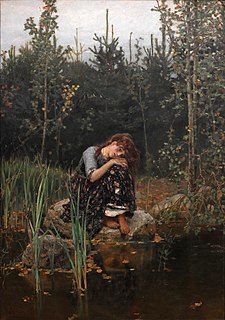
"Brother and Sister" is a European fairy tale which was, among others, written down by the Brothers Grimm. It is a tale of Aarne–Thompson Type 450. In Russia the story was more commonly known as Sister Alionushka, Brother Ivanushka, and collected by Alexander Afanasyev in his Narodnye russkie skazki.

The Six Swans is a German fairy tale collected by the Brothers Grimm in Grimm's Fairy Tales in 1812.

Don Juan Manuel's Tales of Count Lucanor, in Spanish Libro de los ejemplos del conde Lucanor y de Patronio, also commonly known as El Conde Lucanor, Libro de Patronio, or Libro de los ejemplos, is one of the earliest works of prose in Castilian Spanish. It was first written in 1335.

"The Juniper Tree" is a German fairy tale published in Low German by the Brothers Grimm in Grimm's Fairy Tales in 1812. The story contains themes of child abuse, murder, cannibalism and biblical symbolism and is one of the Brothers Grimm's darker and more mature fairy tales.
The Canary Prince is an Italian fairy tale, the 18th tale in Italian Folktales by Italo Calvino. He took the tale from Turin, making various stylistic changes; he noted it developed a medieval motif, but such tales as Marie de France's Yonec produced a rather different effect, being tales of adultery. A variant on Rapunzel, Aarne–Thompson type 310, The Maiden in the Tower, it includes many motifs that differentiate it from that tale. Other fairy tales of this type include Anthousa, Xanthousa, Chrisomalousa, Petrosinella, Prunella, and Rapunzel.

The Legend of Snow White is an Italian-Japanese anime series produced by Tatsunoko Productions and Mondo TV, based on the 1812 European fairy tale. Directed by Tsuneo Ninomiya and using a screenplay written by Jinzō Toriumi, the series premiered on NHK on 6 April 1994 and ran for 52-episodes until its conclusion on 29 March 1995. All episodes of this series were dubbed to Arabic and released on Spacetoon for the first time in the Arab world.
"The True Bride" or "The True Sweetheart" is a German fairy tale collected by the Brothers Grimm in Grimm's Fairy Tales as tale 186.












